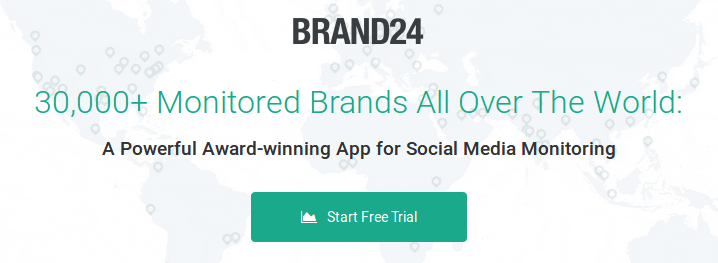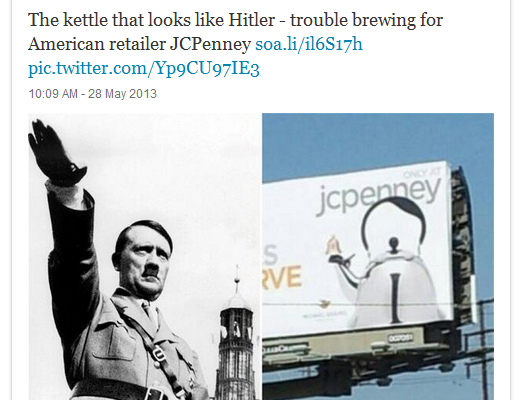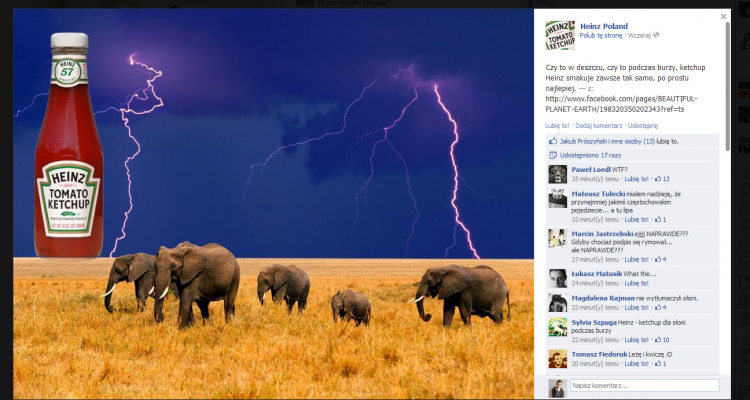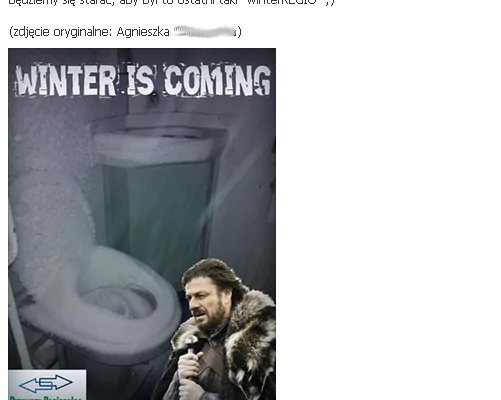INTERVIEW: Monika Czaplicka on How to Win in a Social Media Crisis
We recently had a chat with Monika on how to avoid a crisis in social media and the positives that we can take away from it when we do finally get caught up in one. Here’s what we learned:
There are so many topics we need to be focused on. Why did you choose to deal with crises in social media?
I think that, actually, I didn’t choose ‘social media crisis’. It chose me, because, it was almost 5 years ago, I was working in a social media agency and we were just laughing during a meeting about Nestlé. They had a huge crisis because a mother had found a rat in her child’s food.

We were just joking, like, ‘oh, yeah, it would be a great idea to write to them (Nestlé) and tell them that we can help them with this social media crisis.’ Of course, as an agency, we didn’t do that. But I thought, ‘wait, that’s kind of a good idea’ because nobody’s working with social media crises and they’re quite popular.
Some time earlier, there was a big social media crisis with another company. So, I thought, ‘OK, let’s do something about this’. So I made this fan page which is about social media crises, called Social Media Crises Blow up on the Weekend because as we all know, the weekend is when we all have some free time, and people who usually work (during the week) then go on social media. So, there’s nobody in administration to work out a crisis and there are many people who are interested in them. So, I created this social media fan page and was writing about crises, and I thought, ‘OK, let’s write about something interesting, like case studies’. So I started writing case studies. And I thought, ‘OK, that’s nice. Let’s make an ebook about this.’ So I started writing an ebook (about) how to handle a social media crisis and so on.
After 130 pages, I thought ‘hm, that’s a bit too much for an ebook.’ So, I thought ‘OK, let’s make a book about it.’ I wrote to Michał Sadowski, who is, of course, the head of Brand24. I asked him about making a book because he had just published one a few months earlier. He said ‘OK, no problem. I will put you in touch with my publisher,” and that’s how it was. I published my book about handling social media crises and (that’s when) the fun began, because people started to know me and now I have around 27 or 28 thousand people visiting the social media crisis fan page and I have a group with a few dozen people who talk about it and discuss it and so on. It’s a huge topic and I really love it, so I think that was a sign from social media: ‘Monika, do it!’
I think you have quite a huge community in your social media regarding crises.
The fun part is that my friend wrote to me, that he’d been looking through some old presentations at his company, which I absolutely don’t know / never worked at, and so on. One of the presentations was just about me, how to handle me when there is a social media crisis, or I will write about it… I was laughing so hard. It’s awful when people think that I’m creating the social media crisis and that they have to handle me instead of the crisis.
That’s quite an interesting story. Please tell me – since a lot of brands do not have any plans about how to react in case of a social media crisis – what is the main cause of this situation?
I think, as usual, we think that we are immortal. We think that no problems can harm us, and so on. So, usually, we think that we are safe and don’t need to prepare ourselves. Of course, this is good thinking for somebody who is, like, ‘yeah, everything’s okay’. But then a crisis comes, approaches, or however you want to put it. It just happens, and they’re, like ‘oh, God, what do we do now?’
So, I think that companies should think about this beforehand, because it’s just like the flu. If you don’t do anything, you will probably get the flu. If you prepare yourself, eat vitamins, or get a flu shot, or whatever, you’ll probably be immune to this. And it’s the same with social media crises. You can prepare so that you’ll be safe so even if something happens, you can react because you’ll know how to react. You don’t have (to go through) all the emotions because you’re prepared.
You can consult (others) for information. This doesn’t (necessarily) mean me, but everybody, even within your company. You can, of course, test the results and your ideas. And, of course, you’ll have much, much, much more time because if you do a dry run, you can think about (possible) answers, you can prepare, for example, 3 different answers or statements, or whatever. It’s much better because you’ll just have to apply what you’ve already tried in a real situation. This is easy peasy and much easier than working with all the media interest, all the people, the tension, and everything. I think it’s really, really better to prepare and if you think that social media crises don’t concern you, you’re just stupid.
OK, I got it. My next question would be how we can avoid this, but in some ways, you’ve already answered this. Still, maybe there’s something else that we can do to avoid a crisis at our company.
Of course, because as an American company measured (Altimeter Group), around 75% of social media crises can’t be avoided. So there’s a huge amount of situations that can never avoid a social media crisis.
First of all, we can prepare, which is kind of obvious. Secondly, we need to be proactive, because usually a company thinks, ‘OK, let’s not interact with people so everything will quiet down and nobody will notice.’ But that’s usually what makes people even more angry. So, if you don’t reply, if you don’t do anything – interact with people, they just think that you’re avoiding them or not treating them like real people. We have to remember that our clients, like any other people, are our partners on the Internet. So, if we don’t reply to their concerns, problems, questions, they’re just getting PO’d and becoming more and more angry. That’s usually what makes social media crises even bigger, which is something that companies usually don’t think about. They think it’s making things more quiet, which is not true.
Of course, you can also think about reacting quickly because sometimes if you react quickly to some questions, it also helps to avoid a social media crisis. But the important thing to remember is that you really, really have to think about the answers.
So, it’s not so much that a quick answer will be as good as a good answer in mellowing out what’s happening. Of course, it’s nice if you answer in a few minutes, in 15 minutes, or something like that. But if you post something stupid, it’s kind of obvious that the situation will blow up and people will be more pissed off and more angry than before. So I always say that it’s better to wait 5 minutes and think about what you’re going to write than it is to post something stupid – because then you’ll have to clean up afterwards and say you’re worry and so on.
OK, before I go to the next question, you said something interesting – that we should wait a little rather than reply very fast. I’m very curious: what is the time limit for us to answer a question during a social media crisis? You said 5 minutes, but maybe sometimes it’s 15 minutes. How much time do we have to reply at the first sign of a crisis?
Generally, there is no good answer because when I asked the people who made this survey about social media and answering questions and all this stuff connected with service, surveyors said that, for example, they can wait a few hours on Facebook to get an answer. Of course, it depends, because if somebody is really angry and they’re waiting for an answer now, you don’t have 3 hours to answer. So it’s rather 5 or 15 (minutes) than an hour. Generally, I think people are willing to wait around an hour or 2 before they do anything on Facebook.
Of course it’s kind of different on Snapchat or Twitter because, of course, there you have to really react quickly and you have just a few minutes. I’m sure that if something is happening on Google+, this is irrelevant. On LinkedIn, for example, people can wait even more than 2-3 hours, people can wait even half a day or something like that. I think that, generally, if we have no clue what to do, the easiest way to ‘reset the clock’ is to answer that we’ve seen your post, your concerns, and so on; we’re working on it. You don’t have to write them anything concrete if you have no clue what to do, but then you show the client and other people who are watching, that you have seen this post.
Usually, if you have no answer for some time, the person who wrote the post and everybody who’s watching (we need to remember that there is a huge amount of people who will be watching us and checking what we -the company – are writing to our client), everybody’s checking to see if we saw the comment, if we started working on it, and of course, the problem is that usually companies don’t say so (when they see or start to work on the problem).
Without any interaction, the person who wrote the comment has no clue about whether we’ve seen the post, or if we’re just avoiding it, or what’s happening. So the easiest way to reset the clock is to wait, about, let’s say an hour, and then write ‘we’ve seen your post and we’re working on it. We’ll get back to you in 5 hours’. Then people say ‘OK, I will wait’ and they’ll know how long they need to wait. It’s also better to avoid being angry and all the negative emotions around the topic ‘OK, they didn’t answer me in 2 hours. They hate me. They’re avoiding me.’ Or whatever.
OK, understood. And I think that you also part of my next question, which was about the first step that we should take during a situation of crisis. So, I think it’s ‘react quite fast’ but what are the next steps?
Not quite. My first (piece of) advice is to go grab a coffee or tea or whatever you like. Because usually, as I’ve seen in many social media crises, people are so emotionally attached to the situation – on both sides: the client who has a problem or issue, and the company. Usually, all the negative emotions are just crashing down on social media. That’s why all – OK, maybe not all – but many situations are really badly handled, because they’re so emotional.
So, first things first: cool down. Chill out a bit and distance yourself from the situation, because if we’re very emotional, then usually, if somebody writes to us that our company sucks, we’re emotional because we feel like it’s about us and not the company. It’s really hard to detach yourself from the company where you work or which is yours. Usually we react very aggressively because somebody’s attacking us. If we chill, take a step back, and see the bigger picture, we can write something which is more factual, something that’s really good rather than emotional.
The first step is really to step back and then of course we can think about – if we didn’t prepare for this beforehand – we can think about the answers. Of course, to prepare the answer, we have to have information. We need to analyze who wrote the post, what it’s about, who interacted, and if the person who wrote the post is also the person who has the problem, because sometimes somebody else – a blogger, for example – is writing about somebody else or a client. We also have to check who the victim is, who’s writing about it, etc.
Of course, social media monitoring tools are very useful at this stage because we can analyze if this topic (is restricted to) just this single post or if a blogger wrote a blog post, did he post it on many sites, or just on our page? We can check the amount of damage that has been done.

Then we can prepare the statement. Of course, there is the “5 C” rule that you can apply to the statement:
First of all, you need to confess. Confess that you did wrong or confess that something didn’t go well within the product / service that you offered, and so on. Of course, if the problem was not on your side, for example, if it was (due to) bad weather, you can write this. But you have to put some emotions there – good emotions, because a social media crisis is all about the bad emotions that somebody has.
Handling a social media crisis is about making bad emotions go away, so that there are good emotions between you, your clients, and all the people who are watching. So, if you confess and say something showing empathy, you can (avoid) being seen as a company that is a bureaucratic monster, but you can be seen as a person who understands negative emotions.
For example, imagine you have something, like a computer. You’re working on it, and then it breaks down. You’re really angry because all the work you’ve been doing just got flushed down the toilet without any notice. So, of course you start screaming at the company ‘your computers are shit’ and so on. If they start to say ‘we understand you’re angry because all the work you’ve been doing is dead,’ you feel much better because you feel like on the other side of the argument, there’s someone who understands your emotions.
Then, of course, you need to have some contrition because I know it’s hard to say ‘I’m sorry’ because usually we think that if we say we’re sorry, this means that we’re guilty. But this really isn’t what it means. It’s all about the emotions. It’s all about the empathy that you have. So, even if it is, for example, a company that we work with, like our transportation guy (whose vehicle) broke down at a stop, or something like that, we should say we’re sorry. And do it within our company, rather than say ‘no, this wasn’t our company, we’re super. It’s just the delivery guy, the courier, the postman, or whatever.’
So, apologize and be true about it, because really, most people just wait for it. They don’t want anything else – they just want to see / hear you say you’re sorry and that you think that what happened was wrong.
Then you need to counteract because, as I said, you can prepare and so on, but you can also counteract (to accusations that) you don’t write anything back – you can interact with the person and try to make him/her happier. What you should write depends on the situation, but generally, all good emotions. Don’t write that the client is stupid or that he doesn’t know how to use your product or whatever else, because this also makes it more negative and angry.
Then you can correct the error. So, for example, if the computer is broken, you can send a new one. If the service wasn’t good, you can give some promotion or free stuff, and so on. This makes the customer happy and her experience with our company better and better.
Of course, in the end, you should compensate because if someone had a negative experience with our company, it’s really, really important that we compensate to make it better. And, of course, we have to remember that it’s not about just one person. There are probably thousands, or hundreds of people, who are watching, who are reading this post. The topic was probably just seen by our fans or friends of the person who wrote it… they don’t want to see that we’re perfect or that we never make mistakes, because all companies do. Products fail and services aren’t as good as they should be. The most important thing is that people should know that if something is wrong, they can go to the company and they will interact in the proper way. So, they compensate for the problem and they make the experience good again.
I’m a huge fan of Gary Vaynerchuk, and he’s always saying ‘give, give, give, and make it about the people, not your company.’ It’s the same with social media crises. So if you give, compensate, and say you’re sorry, there’s a 99% chance that you’re handling your social media crisis in a very good way.
Wow, that was a big dose of information. Very, very useful. Since we’re talking about reactions, how brands react, can you share some examples for how companies have solved social media crises in the best possible way.
Yeah, sure. The best way is to see the examples by ourselves, so, I will also send you some screen shots. I will try to find some English examples.

Generally, you can handle a social media crisis in many different ways. For example, if the social media crisis is pretty small, where you’ve just made a small error, you can try to have fun and laugh about it.

I’m thinking about a social media crisis where I really liked the way that it was handled. Heinz, the ketchup brand, had a problem because their graphic designer made something horrible. Imagine a Savannah with elephants. There’s a storm there, and there’s a huge ketchup bottle. The copy says something like ‘whether it’s raining or not, Heinz ketchup tastes the best.’ It generally makes you think ‘what the heck just happened? Was he on drugs or something?’ Of course, this isn’t a big social media crisis, but generally, people were saying ‘OK, you need to use a different social media agency’… things like that.

So, they (Heinz) thought ‘let’s delete this because it’s horrible for our brand’ and, of course, people on the Internet are people on the Internet… very specific… they were, like ‘ok, let’s make a fan page and tell Heinz “bring back the elephant!”’ Of course, the company was, like ‘sh**. We deleted it and they want it back.’ So, they re-posted it but asked the company to help them and they created a contest. Of course, many people loved the idea about the ketchup, the elephant, the storm, and everything because it was so surreal. So, they started making their own different graphics and pictures of elephants with Heinz… just anything you can imagine. So, the company (Heinz) said ‘OK, that’s a good idea. Let’s create a contest.’ People posted their pictures, with ideas about where Heinz ketchup could be posted. Of course, there was also a 2nd part to the contest about creating copy to go with this picture of the elephant in the storm: to create the best copy ever. The contest was a huge success because it made people laugh and have fun. They were very abstract about the topic, and created things for Heinz, like ‘if you eat Heinz, you’ll have great ideas and it will inspire you’.
From a silly post, which was initially regarded with ‘this is a horrible post’, they got the idea to focus on getting inspired and being surreal. This is one point.
Of course, you have to remember that you should never attempt to mock the client. That’s a horrible thing to do because when somebody is being mocked, they feel bad. There are many negative emotions, etc. If you’re trying to get a laugh out of something, make sure it’s just about the situation or about your company, and not about your fans or your clients.
In any other situation, you can just use the “5C” rule: say you’re sorry, confess, and so on. This should be fine because it’s been tested. It’s the general idea being handling social media crises in public relations, and has been for many years. It’s an easy and, let’s say, safe way.
Of course, you can also try to think about something unusual. For example, I remember a brilliant situation. We (our agency) were working with a train company and somebody posted a picture of our train toilet, which was absolutely white. It was all snowy and icy. It looked really horrible.

Of course, the question was ‘what happened?’ We got the answer that somebody left the window open and the wind had been very cold, around -20 or something like that… and everything froze. We couldn’t reply to the client by saying ‘sorry, somebody opened the window and nobody closed it. You’re stupid. Go away.’
So, we were thinking ‘what the heck should we do?’ Fortunately, for us, it was the beginning of the Game of Thrones. Some of our fans started to make some mock-ups and mash-ups using Game of Thrones with ‘brace yourself: winter is coming’. So we took one of those pictures and posted it, saying ‘we’re sorry. This shouldn’t have happened’, etc., and the typical things you have to say to handle a crisis. Because we used this picture with the caption ‘brace yourself: winter is coming’, we also created a ‘smile’ around the name of the company because it’s called Inter-region, but we put Winter-region. People started to laugh and took it much better than we usually see.

Train companies in Poland are really hated, so we were really worried. We used pop culture and had some fun and people said ‘it’s okay’. You know, we were all in the same situation, as it was very cold at the time. I think that many people now realize that they need to be more careful with the windows on the train.
Generally, you just have to turn negative emotions into positive ones and try to make the situation as nice as possible. Of course, you can also sometimes be more edgy. I remember Durex had this problem where one of their bloggers was doing a test with one of their condoms and, of course, the condom broke. In Poland, the reaction was like ‘oh my God. Are we going to end up with a huge number of babies?’

The company answered by saying that the test was cool and they really liked the idea of testing the condoms, but they usually test around 300, not just 1, and that you shouldn’t test it with champagne bottles because the bottle can be sharp so it can break the condom. Of course, (they mentioned that) you can hold about 30 liters of sperm in the condom, but the force from the bottle opening is very different than with sperm. They wrote everything in a humorous way, with the message that the test was cool but needs to be improved. They didn’t say anything like ‘you’re stupid. You don’t know how to do the test properly.’ They were, like ‘we know that from our tests, the condoms should be as tough as (the rubber from) a car tire. They should be really strong yet you shouldn’t be able to feel anything. Of course, they’re trying to make it as thick, as slim, and as nice as possible.
In general, they didn’t try to create any negative emotions around the test being bad. Instead, they stated in a nice way that the test was okay but needs to be done better.
That’s the main idea. Create good emotions and try to be as open-minded as possible.
I think this is a very good conclusion to this interview. I think I couldn’t have made it any better.
A social media crisis can be a way to win people over, make your company more professional, and to become more successful. If you do it well, with positive emotions, you will win.
OK, that’s a very good message to end this conversation with. Thank you very much for your time and for all the information that you’ve given us!
Related articles


![7 Steps for Effective PR Crisis Management in 2025 [Infographic]](https://brand24.com/blog/app/uploads/2024/04/PR_Crisis-600x335.webp)